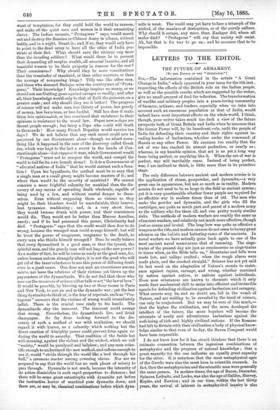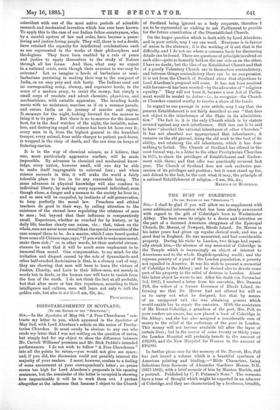LETTERS TO THE EDITOR.
THE FUTURE OF ARMAMENT.
pro THE EDITOR OF THE " SPECTATOR:] SIR,—The information contained in the article "A Great Change in India," which appeared in your issue for the 9th last, respecting the effects of the British rule on the Indian people, as well as the possible results which are suggested by the writer, give no small amount of food for reflection. The transformation of warlike and military peoples into a peace-loving community of farmers, artisans, and traders, especially when we take into account such an enormous population as that of India, would indeed have most important effects on the whole world. I think, though, your writer takes much too dark a view of the future prospects both of Great Britain and India when he assumes that the former Power will, by its beneficent rule, unfit the people of India for defending their country and their rights against invading hordes of barbarians, whether under the command of Russia or any other Power. He assumes too readily that the art of war has reached its utmost perfection, or nearly so ; whereas, in my humble opinion, that art is as yet a long way from being perfect, or anything like it. When the art of war is perfect, war will inevitably cease. Instead of being perfect, war, I am inclined to think, is little more than in its primitive stage.
The only difference between ancient and modern armies is in the application of steam, gunpowder, and dynamite,—a very great one in appearance, but not so much so in reality. Modern armies do not need to be so large in the field as ancient armies ; yet it is very questionable whether fewer people are required for an effective war in modern times than of old. The men who make the powder and dynamite, and the girls who fill the cartridges, are quite as much part and parcel of a modern army as the soldiers who fire them off, and run pretty nearly similar risks. The methods of modern warfare are exactly the same as of ancient warfare, and relatively not much more effective, though just as coarse and brutal. The long-bow was quite as effective a weapon as the rifle, and modern cannon do not seem to be any great advance on the balistes and battering-rams of the ancients. In naval warfare we have actually gone back again to one of the most ancient naval manceuvres, that of ramming. The siegetrains of the present day are just as cumbersome as siege-trains in times when, as the Bible tells us, "Mountains and hills were made low, and valleys exalted ; when the rough places were made plain, and the crooked straight." Science has not yet said. its last word on the adaptation of Nature's secrets to resistance against rapine, carnage, and wrong, whether exercised by nation against nation, or nations against individuals. Even now substances are known to chemists which it only needs finer mechanical skill to make into efficient and invincible agents for defending civilisation against barbarism and savagery. What secrets may be, and no doubt are, hid in the womb of Nature, and are waiting to be revealed by the hand bf science, can only be conjectured. But we may be sure of this much,— that the higher the civilisation, and the more developed the intellect of the future, the more hopeless will become the attempts of needy and adventurous barbarians against the well-being of rich and highly civilised nations. If the Romans bad left to Britain with their civilisation a body of physical knowledge similar to that even of to-day, the Saxon Conquest would have been impossible.
• I do not know how far it has struck thinkers that there is an intimate connection between the ingenious combinations of metaphysics and the progress of natural knowledge ; that a great capacity for the one indicates an equally great capacity for the other. It is notorious that the most metaphysical ages of the Greeks were also the most keen in scientific research. In fact, then the metaphysician and the scientific man were generally the same person. In modern times, the age of Bacon, Descartes, Spinoza, Leibnitz, and Locke, was also the age of Galileo, Harvey, Kepler, and Newton ; and in our time, within the last thirty years, the revival of interest in metaphysical inquiry is also
coincident with one of the most active periods of scientific research and mechanical invention which has ever been knownl'o apply this to the case of our Indian fellow, countrymen, who, by a careful system of law and order, have become a peaceloving and justice-loving people. They will, there is not a doubt, have retained the capacity for intellectual combinations such as are represented in the works of their philosophers and theologians. They have been enabled by a rule of peace and justice to apply themselves to the study of Nature through all her forms. And then, what may we expect in a national crisis, even though their aversion to war may be extreme P Let us imagine a horde of barbarians or semibarbarians persisting in making their way to the conquest of India, as an easy prey and rich booty. The Indians send out no corresponding noisy, clumsy, and expensive horde, in the sense of a modern army, to resist the enemy, but simply a small corps of resolute and adroit chemists, physiciens, and mechanicians, with suitable apparatus. The invading horde meets with no resistance, marches as if on a summer parade, and enters India on its journey of murder and rapine. It encamps for the night, looking forward for the morrow to bring it to its prey. But there is no to-morrow for the doomed host, for in the dead watches of the night, the invisible, noiseless, and destroying angel of science has been let loose over it; every man in it, from the highest general to the humblest trooper, every animal, from noble charger to patient pack-horse, is wrapped in the sleep of death, and the sun rises on heaps of festering carrion.
It is in the way of chemical science, as I believe, that war, more particularly aggressive warfare, will be made impossible. By advances in chemical and mechanical knowledge, every nation, however small, will one day be able to make itself impregnable to external foes ; and when science succeeds in this, it will make the world a fairly tolerable place to live in for any reasonable being. The same advances in physical knowledge will also conduce to individual liberty, by making every oppressed individual, even though alone, a danger and a menace to the society he lives in ; and so men will be compelled, by instincts of self-preservation, to keep perfectly the moral law. Preachers and ethical teachers do good in their way, by calling attention to the existence of the eternal laws regulating the relations of men to men ; but beyond that their influence is comparatively small. Experience, whether as vouched for by history, or by daily life, teaches clearly one axiom, viz.: that, taken on the whole, men are never more moral than the special necessities of the ease compel them to be. As a maxim, which I once heard quoted from some old Chinese sage, says, "If you wish to make men moral, make them rich ;" or, in other words, let their material circumstances be such that it will be much more unpleasant to be immoral than moral. One compensation, to my mind, for the irritation and disgust caused by the acts of dynamitards and other half-cracked doctrinaires is that, in a clumsy sort of way, they are showing that men will have to learn the virtues of Justice, Charity, and Love to their fellow-men, not merely in words but in deeds, or the human race will have to vanish from the face of the earth. I do not think the last at all probable, but that after more or less dire experience, according to their intelligence and culture, men will learn not only to talk the golden rule, but also to act it.—I am, Sir, &c.,
PaomoonAs.



































 Previous page
Previous page